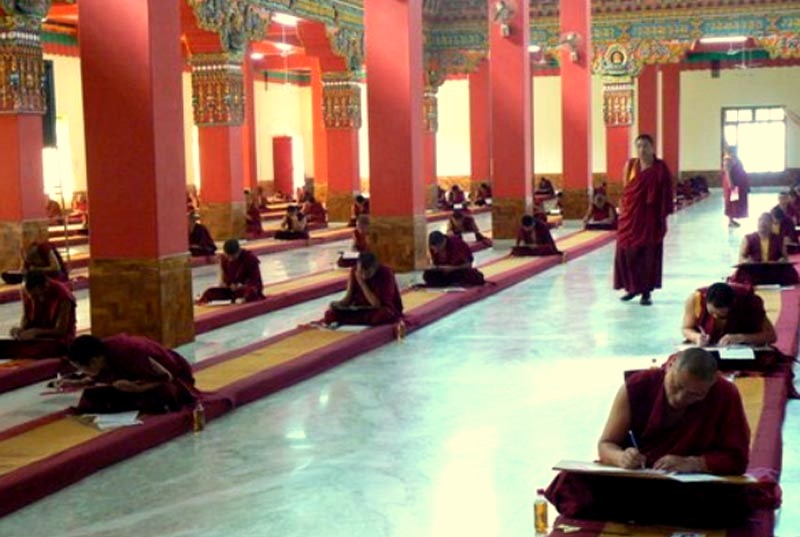 Mundgod, India: - The 2011 Gelugpa University exams are finishing this week at Drepung Monastery in Mundgod. This year, 602 monks are taking the exams, and there are 30 examination controllers.
Mundgod, India: - The 2011 Gelugpa University exams are finishing this week at Drepung Monastery in Mundgod. This year, 602 monks are taking the exams, and there are 30 examination controllers.
Monks taking these exams have been rigorously studying a program of Buddhist philosophy that includes the five measures of Buddhism: Pramana (logic), Prajnaparamita (Perfection of Wisdom), Madhyamika (Middle Way), Abhidhama (Treasure of Knowledge), and Vinaya (Monastic discipline). They also study Tibetan grammar poetry, Tibetan religious and political history, as well as the proper way to write letters to His Holiness the Dalai Lama and to Tibetan government officials like the Kalon Tripa (prime minister). The program lasts six years, and monks can join only after they have studied at another monastic university for around 18 years.
After going through the six year program successfully, monks are awarded the Geshe Lharampa title, the highest academic title in Tibetan Buddhism.
The high-level Buddhist philosophy studied includes doctrines of emptiness, peaceful mind, the middle way, compassion, and right action and how to reach enlightenment. Students must study and memorize large ancient Buddhist texts as well as various commentaries and teachings on those texts. They are required to quote from the texts exactly in oral examinations and debates, as well as to precisely identify which text any particular passage is from.
Students who have completed their first and second year must take nine writing and five debate exams; those who have completed the third and fourth year must take five writing and five debate exams; and those who have finished their fifth and sixth year must take a long debate exam on the five measures of Buddhism.
Much pressure revolves around the exams; while they get second chances in their earlier years, if students do not pass the exams on the first try after their fifth or sixth years, there is no chance to retake the exam, and, explained the administrator of the Mundgod branch of Gelugpa University, the monk will not get the title of Geshe Lharampa in this lifetime. "It's our rule," he said, smiling.
Thus, monks began preparing for these exams in February, forming small study groups among themselves to practice debating and memorization. The program is extremely rigorous. Each year out of a class of 150 monks, around 70-80 are left in the sixth year.
There are six monasteries of Gelugpa University; the three major ones are Drepung, Ganden, and Sera. The Drepung and Ganden Monasteries are located in Mundgod, and Sera is in the Bylakuppe settlement. They are all modeled after the original monasteries of the same names in Tibet, which were established in the fifteenth century and which underwent much damage during the Chinese invasion in 1959.
The administrator said that most monks studying at Gelugpa University come directly from Tibet; others come from Tibetan settlements in India, often from the Himalayan regions like Himachal and Ladakh. Yet others come from Nepal, Mongolia and Taiwan to study.
After graduating and receiving their Geshe Lharampa title, some monks continue to live in the settlement, teaching the new monks, some return to their homes, some join the university administration, some work as translators, some move to foreign countries, and some go to the wilderness to meditate.
As for future plans of the university, he said that there are plans to register Gelugpa University under the University Grants Commission (UGC) of the Government of India. "After this, we will be recognized [by the government] as a university, not just a monastery."


![Tibet has a rich history as a sovereign nation until the 1950s when it was invaded by China. [Photo: File]](/images/stories/Pics-2024/March/Tibet-Nation-1940s.jpg#joomlaImage://local-images/stories/Pics-2024/March/Tibet-Nation-1940s.jpg?width=1489&height=878)















